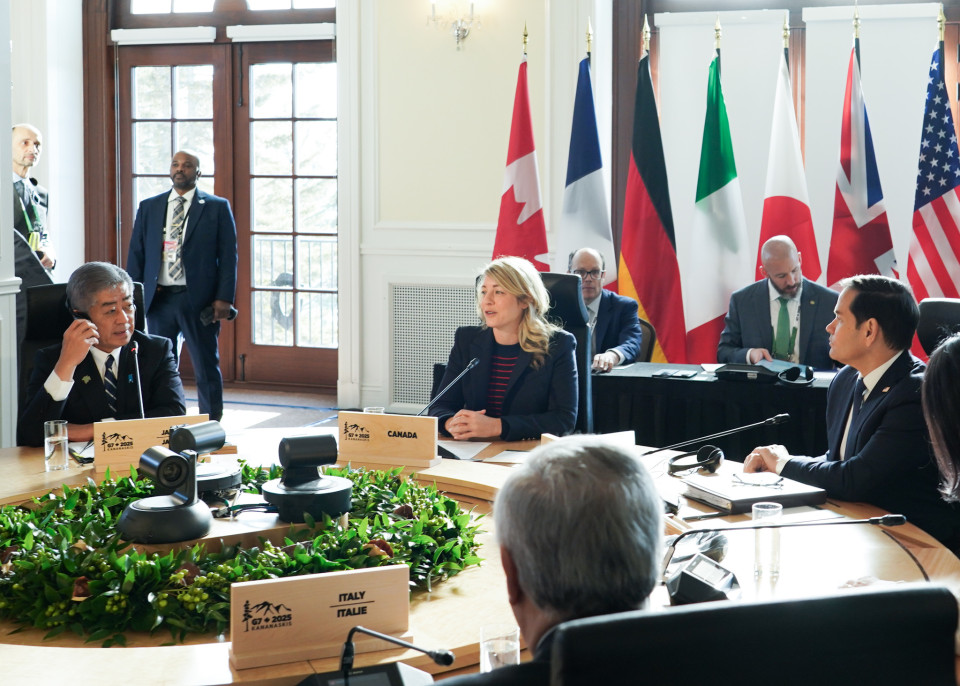G7 foreign ministers set to condemn China’s maritime actions

G7 foreign ministers hold talks in Charlevoix, Canada, on March 13, 2025
The foreign ministers of the Group of Seven democracies on Thursday agreed to step up their efforts to end Russia’s war against Ukraine and were set to condemn China’s aggressive maritime actions in the Indo-Pacific region.
While a cease-fire proposal brokered by the United States topped the agenda at their meeting in the Canadian resort town of La Malbaie, Quebec, the ministers also held a session dedicated to China and the Indo-Pacific region.
In addition to a post-meeting joint statement, the G7 plans to issue a separate declaration concerning maritime security that is likely to denounce China by name.
A draft copy of the document seen by Kyodo News said the ministers “condemn China’s illicit, provocative, coercive and dangerous actions that seek unilaterally to alter the status quo in such a way as to risk undermining the stability of regions.”
The wording of the envisaged declaration could still change before the ministers conclude their talks on Friday, a G7 source said, but the copy pointed out moves by China such as land reclamation and the building of outposts for military purposes.
The ministers also plan to express growing concern over Chinese activities to “expand national jurisdiction through use of force and other forms of coercion,” including across the South and East China seas and the Taiwan Strait.
During the session, they recognized that the security of Europe and the Indo-Pacific has become increasingly indivisible, according to the Japanese government.
The top diplomats of Britain, Canada, France, Germany, Italy, Japan and the United States, plus the European Union, renewed their opposition to any attempts to unilaterally change the status quo “by force or coercion” and voiced concern about North Korea’s development of nuclear and missile capabilities, the government said.
It said Japanese Foreign Minister Takeshi Iwaya stressed the need for the G7 to work even more closely to crack down on malicious cyber activities by North Korea, including thefts of crypto assets that have been funding such development.
Since the start of Russia’s full-scale invasion of its neighbor in February 2022, Japan has repeatedly warned that “Ukraine today could be East Asia tomorrow,” in light of China’s continuing military pressure on Taiwan, a self-ruled democratic island that Beijing regards as a renegade province.
While North Korean soldiers have been fighting alongside the Russian military, the other G7 members have said they share Japan’s view that ending the war on Russian terms could embolden China and North Korea.
Canadian Foreign Minister Melanie Joly, chair of the meeting, said the G7 should discuss how it can continue to support Ukraine in the face of “Russia’s illegal aggression.”
“We all want to see just and lasting peace in Ukraine,” she said.But U.S. Secretary of State Marco Rubio has said the United States does not want to use “antagonistic language” regarding the war in the joint communique, suggesting it would make it harder to bring Russia to the negotiating table.
The foreign ministers came together just two days after the United States agreed to resume its provision of military aid and intelligence to Ukraine, which was suspended after Trump and Ukrainian President Volodymyr Zelensky clashed at the White House in front of reporters and cameras.
Following hours of talks between senior officials of the two countries in Saudi Arabia, Ukraine said it was ready to accept an immediate 30-day cease-fire with Russia, as proposed by the Trump administration.
The ministers hailed the U.S.-brokered plan and agreed on the G7’s “unwavering support” for Ukraine, the Japanese government said, adding that some members noted the importance of the group working together to press Russia to respond to the proposal positively.
It remains uncertain if Russia will accept the proposal unconditionally, as U.S. officials try to persuade the Kremlin to help the nascent peace process move forward.
On Thursday, Russian President Vladimir Putin said he is in favor of the U.S. idea in principle, but there are many important issues that need to be sorted out beforehand, signaling he is not necessarily interested in halting the fighting soon.
Putin asserted at a press conference in Moscow that the ongoing process should lead to lasting peace and eliminate the “root causes” of the conflict.
Since Trump’s public spat with Zelensky, Europe’s concern about the U.S. president’s affinity for Putin has grown.
With tensions escalating between the United States and the EU, as well as Canada, over the Trump administration’s tariff threats, it remains to be seen to what extent they can present a united front on upholding a rules-based international order and supporting Ukraine in their planned joint statement.



